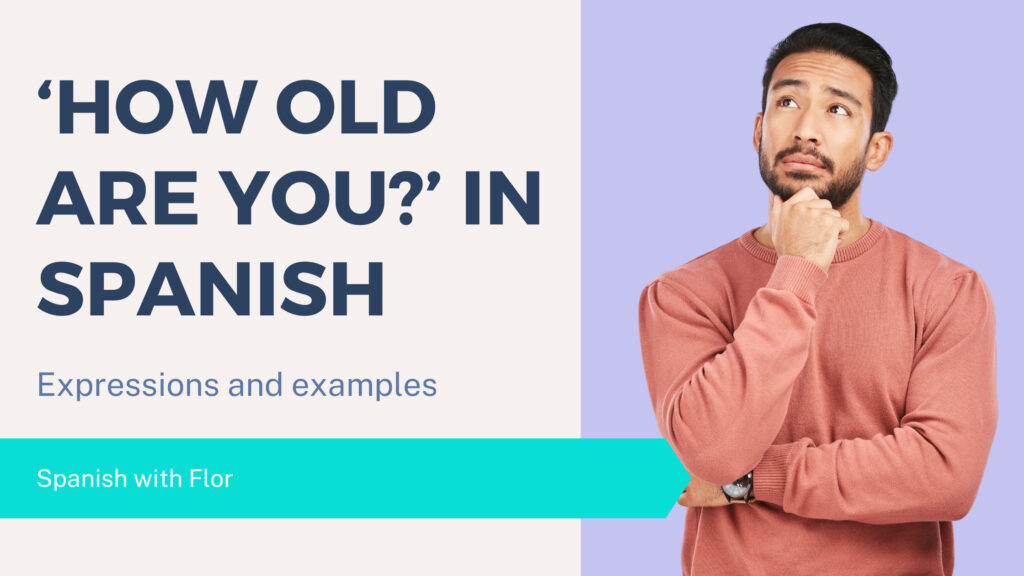If you’re learning Spanish, one of the most basic things you’ll want to know is how to ask someone’s age. In this article, we’ll cover the basics of how to ask someone’s age in Spanish, including grammar and structure, formality and context, and additional resources to help you learn.
To begin with, the most common way to ask someone’s age in Spanish is to use the phrase “¿Cuántos años tienes?” This translates directly to “how many years do you have?” but is the equivalent of asking “how old are you?” in English. This phrase is used in both formal and informal contexts, and is appropriate for use with people of all ages.
When asking someone’s age in Spanish, it’s important to pay attention to grammar and structure. Like many other languages, Spanish has different verb conjugations depending on the subject of the sentence. In this case, you’ll want to use the second person singular form (tú) of the verb “tener“, which is “tienes.” This is why the phrase is “¿Cuántos años tienes?” rather than “¿Cuántos años tiene?” which would be the third person singular form (usted) to make the question more formal.
How to Say How Old Are You in Spanish
Asking someone’s age is a common question in any language, and Spanish is no exception. Here are some common expressions to ask age and respond to age-related questions in Spanish.
Common Expressions to Ask Age
The most common expression to ask someone’s age in Spanish is “¿Cuántos años tienes?” which literally means “How many years do you have?” This phrase is used in informal situations when talking to someone you know well or someone who is around your age.
For more formal situations, you can use “¿Cuántos años tiene?” which means “How old are you?” and is used when speaking to someone older or in a professional setting.
Another expression to ask someone’s age is “¿Qué edad tienes?” which means “What age do you have?” This phrase is also used in informal situations.
How to reply to Age-Related Questions
When responding to age-related questions, you can use the following phrases:
- “Tengo [number] años” which means “I am [number] years old.” For example, “Tengo 30 años” means “I am 30 years old.”
- “Tengo [number] años de edad” which means “I am [number] years of age.” For example, “Tengo 30 años de edad” means “I am 30 years of age.”
- “Nací en [year]” which means “I was born in [year].” For example, “Nací en 1990” means “I was born in 1990.”
Here are some examples of how to use these phrases in a conversation:
- ¿Cuántos años tienes? (How old are you?)
- Tengo 25 años. (I am 25 years old.)
- ¿Cuántos años tiene su abuela? (How old is your grandmother?)
- Mi abuela tiene 80 años. (My grandmother is 80 years old.)
- ¿Qué edad tienes tú? (What age do you have?)
- Tengo 30 años de edad. (I am 30 years of age.)
- Edad por favor (Age, please)
- Tengo 54. (Im’m 54)
Conjugation of ‘Tener’
When asking someone’s age in Spanish, it is important to use the correct grammar and structure. In this section, we will cover the conjugation of the verb ‘tener’ and the use of ‘ser’ and ‘estar’ in age contexts.
The verb ‘tener’ is the most common way to express age in Spanish. To say “I am X years old” in Spanish, you would say “Tengo X años”. Here is the conjugation of ‘tener’ in the present tense:
| Person | Conjugation |
|---|---|
| Yo | tengo |
| Tú | tienes |
| Él/Ella/Usted | tiene |
| Nosotros/Nosotras | tenemos |
| Vosotros/Vosotras | tenéis |
| Ellos/Ellas/Ustedes | tienen |
Formal vs. Informal Addressing
In Spanish, the informal way of addressing someone is “tú,” while the formal way is “usted.” When asking someone’s age in Spanish, it’s important to use the appropriate form of address. If you’re speaking with someone you know well and have a casual relationship with, you can use the informal “tú” form. In this case, you would ask “¿Cuántos años tienes?” which translates to “How old are you?”
On the other hand, if you’re speaking with someone you don’t know well or someone you need to show respect to, you should use the formal “usted” form. In this case, you would ask “¿Cuántos años tiene?” which also translates to “How old are you?”
How should you ask an adult how are you in Spanish?
It’s also important to consider cultural nuances when asking someone’s age in Spanish. In some cultures, asking someone’s age is considered impolite or even offensive. However, in Spanish-speaking cultures, it’s generally acceptable to ask someone’s age, especially if you’re trying to get to know them better.
Additionally, the context of the conversation can also affect how you ask someone’s age. For example, if you’re in a formal setting, such as a job interview or meeting, you should use the formal “usted” form and ask “¿Cuántos años tiene?”
It’s also worth noting that the direct translation of “How old are you?” in Spanish is “¿Qué edad tienes?” However, this phrase isn’t commonly used in Spanish-speaking cultures and can come across as awkward or even rude. Stick to “¿Cuántos años tienes?” or “¿Cuántos años tiene?” depending on the level of formality and context of the conversation.
When asking someone’s age in Spanish, it’s important to consider the formality and context of the situation, as well as cultural nuances. By using the appropriate form of address and phrasing your question correctly, you can ask someone’s age in a polite and respectful manner.
If you are looking to start your Spanish learning, I can help you!
Join the Spanish with Flor Basic Spanish Course where I will teach you all the basics to kickstart your Spanish!


